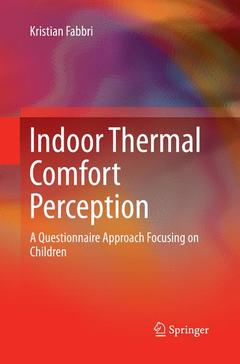Indoor Thermal Comfort Perception, 2015 A Questionnaire Approach Focusing on Children
Auteur : Fabbri Kristian

Providing a methodology for evaluating indoor thermal comfort with a focus on children, this book presents an in-depth examination of children?s perceptions of comfort. Divided into two sections, it first presents a history of thermal comfort, the human body and environmental parameters, common thermal comfort indexes, and guidelines for creating questionnaires to assess children?s perceptions of indoor thermal comfort. It then describes their understanding of the concepts of comfort and energy, and the factors that influence that perception. In this context, it takes into account the psychological and pedagogical aspects of thermal comfort judgment, as well as architectural and environmental characteristics and equips readers with the knowledge needed to effectively investigate children?s perspectives on environmental ergonomics.
The research field of indoor thermal comfort adopts, on the one hand, physical parameter measurements and comfort indexes (e.g. Predicted Mean Vote (PMV) or adaptive comfort), and on the other, an ergonomic assessment in the form of questionnaires. However the latter can offer only limited insights into the issue of comfort, as children often use different terms than adults to convey their experience of thermal comfort. The books aims to address this lack of understanding with regard to children?s perceptions of indoor thermal comfort.
The book is intended for HVAC engineers and researchers, architects and researchers interested in thermal comfort and the built environment. It also provides a useful resource for environmental psychologists, medical and cognitive researchers.
People Dissatisfied PPD.- Assessment of the influence of the thermal environment using subjective judgement scales.- The Thermal Comfort and Child Development Psychology.- Field research.- Kindergarten Case Study.- Elementary School case study.- Middle School case study.- Conclusions.
Date de parution : 10-2016
Ouvrage de 302 p.
15.5x23.5 cm
Retiré de la vente
Date de parution : 07-2015
Ouvrage de 302 p.
15.5x23.5 cm
Ancienne édition
Accéder à la nouvelle édition.
Thèmes d’Indoor Thermal Comfort Perception :
Mots-clés :
Child’s Understanding of the Concept of Thermal Comfort; Environmental Ergonomy of Children; HVAC Design; Heating; Ventilation; and Air Conditioning Design; Indoor Thermal Comfort Assessment; Indoor Thermal Comfort Assessment for Children; Predicted Mean Vote (PMV); Questionnaire for Indoor Thermal Comfort Assessment; Thermal Comfort Indexes; Thermal Comfort Judgement



